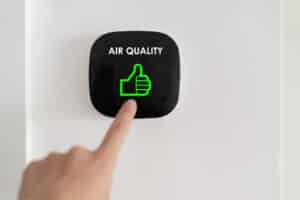
Our bodies become increasingly vulnerable to a variety of health issues as we age, and one sometimes disregarded element is the quality of the air we breathe. Indoor air quality (IAQ) has a significant impact on seniors’ quality of life and respiratory health, which is why it is crucial to their overall health. In this blog, we’ll look at the significance of indoor air quality for seniors, talk about how to make it better, and offer advice on how to test the air to make sure your home is healthy. With the right support from loved ones and elder care, seniors can breathe better.
The Significance of Indoor Air Quality for Seniors
The air that seniors breathe can have a significant impact on their health in general. This can be seen in the following examples:
- Health of the Respiratory System: Asthma, chronic obstructive pulmonary disease (COPD), and other respiratory disorders are more common in seniors. A reduction in lung function overall and breathing difficulties might result from poor indoor air quality. Sustaining respiratory health and averting issues linked to respiratory health require clean air.
- Immune System: Seniors are more vulnerable to infections and illnesses since aging is linked to a decreased immune system. Among other indoor contaminants, dust mites, mildew, and airborne particulates can weaken the immune system. Enhancing indoor air quality contributes to a healthier atmosphere that strengthens the immune system’s defense against infections.
- Cognitive Function: Research has demonstrated a link between cognitive function and air quality. Senior cognitive impairment has been related to high concentrations of contaminants in indoor air and poor indoor air quality. Improved mental health, memory retention, and cognitive function are all impacted by enough ventilation and clean air.
How Can Elder Care and Loved Ones Make Indoor Air Quality Better?
It all starts with ensuring adequate ventilation. This means opening windows and doors on a regular basis to let fresh air in. This is especially important during the winter months in colder areas where both doors and windows are kept locked tight for the most part. In order to eliminate pollutants and stop the accumulation of indoor air contaminants, loved ones might also think about installing exhaust fans in bathrooms and kitchens.
Air purifiers with HEPA filters might also be utilized to capture and eliminate allergies, pollutants, and airborne particles. The elder care team can monitor where seniors spend most of their time and ensure air purifiers are working well in those spaces. Additionally, in humid environments, it’s essential to maintain a good balance to stop the growth of mold and dust mites. This might mean using dehumidifiers in moist places and fixing leaks right away to prevent problems with moisture.
Elder care can also help seniors lessen the buildup of indoor pollutants by dusting and cleaning living areas on a regular basis. Particular attention should be given to mattresses, upholstery, and carpets, as they may contain dust and allergens.
The quality of their indoor air can have a big impact on seniors’ health and wellbeing. To ensure they have the best environment for breathing and their health, the elder care team and loved ones can follow the tips above.
Sources:
https://blog.pureroom.com/clean-air-is-essential-for-seniors
https://www.lung.org/blog/indoor-air-quality-improvements
https://www.linkedin.com/pulse/silent-killer-our-homes-understanding-how-poor-indoor-zeinali-rzycf/?trk=articles_directory
If you or an aging loved one is considering elder care in Columbia, MD, please contact the caring staff at Care At Home today. 301-970-9706
- 24-Hour Home Care: Special Considerations for Seniors With Dementia - May 9, 2025
- The Best Social Engagement Activities For Seniors At Home - April 25, 2025
- Senior Home Care Makes Chores Easier For Seniors - April 8, 2025
